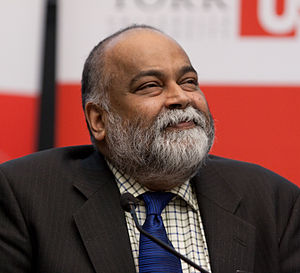Arjun Appadurai

Arjun Appadurai is a contemporary social-cultural anthropologist focusing on modernity and globalization, based in New York [1].
Appadurai was born in Bombay, India in 1949 and educated in India before coming to the United States. He graduated from St. Xavier's High School, Fort, Mumbai, and earned his Intermediate Arts degree from Elphinstone College, Mumbai, before coming to the United States.
He then received his B.A. from Brandeis University in 1970. He was formerly a professor at the University of Chicago where he received his M.A. (1973) and Ph.D (1976). After working there, he spent a brief time at Yale before going to the New School University. He currently is a faculty member of New York University's Media Culture and Communication department in the Steinhardt School. Some of his most important works include Worship and Conflict under Colonial Rule (1981), "Disjuncture and Difference in the Global Cultural Economy" (1990) found in Modernity at Large (1996), and Fear of Small Numbers (2006).
Imaginary
Appadurai articulated a view of cultural activity known as the social imaginary. For Appadurai the imaginary is composed of five dimensions of global cultural flow: 1) ethnoscapes; 2) mediascapes; 3) technoscapes; 4) finanscapes; 5) ideoscapes.
He describes his articulation of 'the imaginary' as:
"The image, the imagined, the imaginary - these are all terms that direct us to something critical and new in global cultural processes: the imagination as a social practice. No longer mere fantasy (opium for the masses whose real work is somewhere else), no longer simple escape (from a world defined principally by more concrete purposes and structures), no longer elite pastime (thus not relevant to the lives of ordinary people), and no longer mere contemplation (irrelevant for new forms of desire and subjectivity), the imagination has become an organized field of social practices, a form of work (in the sense of both labor and culturally organized practice), and a form of negotiation between sites of agency (individuals) and globally defined fields of possibility. This unleasing of the imagination links the play of pastiche (in some settings) to the terror and coercion of states and their competitors. The imagination is now central to all forms of agency, is itself a social fact, and is the key component of the new global order" [2]
Appadurai credits Benedict Anderson with developing notions of imagined communities. Some key figures who have worked on the imaginary are Cornelius Castoriadis, Charles Taylor, Jacques Lacan (who especially worked on the symbolic, in contrast with imaginary and the real), and Dilip Gaonkar.
The New School
In 2004, after a brief time as administrator at Yale University, Appadurai became Provost of New School University. Appadurai's resignation from the Provost's office was announced January 30, 2006 by New School President Bob Kerrey. He held the John Dewey Distinguished Professorship in the Social Sciences at the New School.[1] Appadurai became one of the more outspoken critics of President Kerrey when he attempted to appoint himself provost in 2008 [2].
New York University
In 2008 it was announced that Appadurai was appointed Goddard Professor of Media, Culture, and Communication at the NYU Steinhardt School of Culture, Education, and Human Development [3]
Public Culture
Appadurai is a co-founder of the academic journal Public Culture [4]; founder of the nonprofit PUKAR (Partners for Urban Knowledge, Action, and Research) in Mumbai; cofounder and codirector of ING (Interdisciplinary Network on Globalization); and a fellow of the American Academy of Arts and Sciences. He has served as a consultant or advisor to a wide range of public and private organizations, including the Ford, Rockefeller, and MacArthur foundations; UNESCO; the World Bank; and the National Science Foundation.
Doctoral Work
His doctoral work was based on the car festival held in the Parthasarathi temple in Triplicane, Madras.
References
- ^ Airoots Interviews Arjun Appadurai September 21, 2008.
- ^ "Disjuncture and Difference", Modernity at Large, 31
- ^ NYU Steinhardt Appoints Arjun Appadurai As Goddard Professor of Media, Culture, and Communication NYU, Monday, Sep 15, 2008.
- ^ Public Culture Public Culture website
